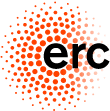GUDHI is a five years project (2014-2019) supported by an Advanced Investigator Grant of the European Research Council and hosted by INRIA
The central goal of the project is to settle the algorithmic foundations of geometry understanding in dimensions higher than 3.
The need to understand geometric structures is ubiquitous in science and has become an essential part of scientific computing and data analysis. Many applications in physics, biology, and engineering involve a variety of higher dimensional spaces such as phase space in particle physics, invariant manifolds in dynamical systems, configuration spaces of mechanical systems, energy landscapes of molecules.
Understanding the geometry of such spaces faces many challenges: choosing appropriate representations of highly non-linear shapes, bypassing the curse of dimensionality, inferring stable properties from data, and providing software that scale with real applications. The GUDHI project aims at advancing the state of the art by developing tight and long-standing interactions between mathematical research, algorithmic design and advanced software development. See the synopsis of the project.
The four main scientific objectives of the GUDHI project are
— To extend current knowledge of simplicial complexes, most notably their combinatorial and algorithmic properties. To fully understand Delaunay-like simplicial complexes. To design new compact data structures and algorithms to encode and process simplicial complexes.
— To develop new algorithms to triangulate non Euclidean metric spaces. To study intrinsic Delaunay triangulations of Riemannian manifolds. To reconstruct submanifolds using Delaunay-like simplicial complexes. To construct crude approximations with quality guarantees. To extend current knowledge on processing non-smooth manifolds.
— To study new robust models for geometric and topological inference. To combine statistical and geometric and topological approaches for data analysis. To study topological signatures of shapes.
— To devise an open source software library for geometric understanding in high dimensions. To disseminate methods and benchmark results on real data from various applied fields.


